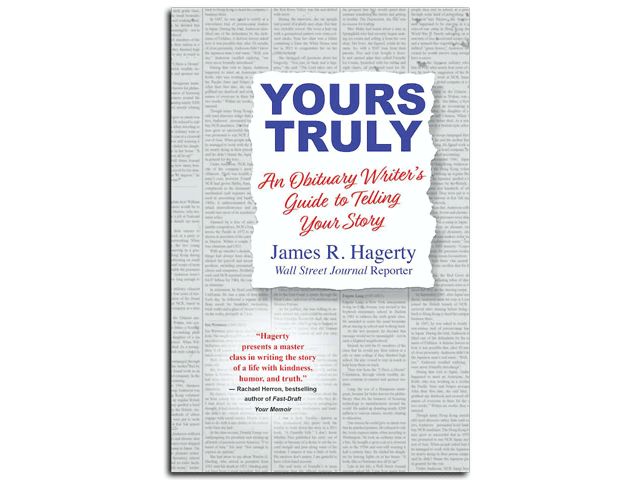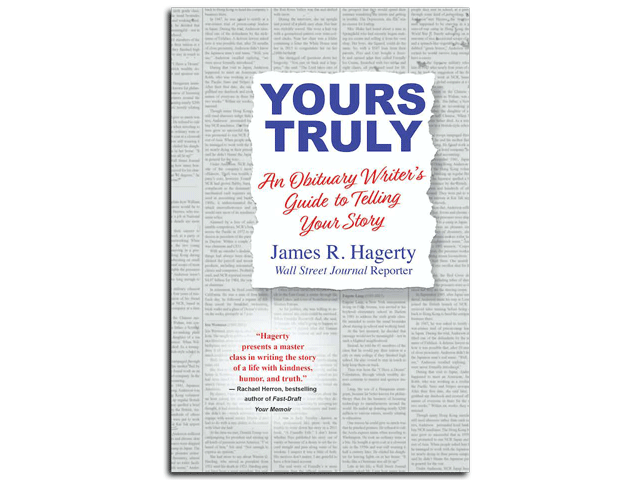An Urban's Rural View
Why You Should Write Your Life Story
A few years before my maternal grandfather died in 1978, he did something more people should do: He wrote his life story. Nothing epic, just five single-spaced typewritten pages and a few lines on a sixth. I cherish my copy.
Grandpa's story is full of juicy surprises. I hadn't known, for example, why he never returned to Italy after immigrating to the United States. Turns out he'd dodged the draft there and was warned he'd be arrested as a deserter if he came back.
The grandpa I knew personally was a retired life-insurance salesman. I had no idea he had also sold shoes, been a factory laborer, worked as an accountant and run his own retail store.
Grandpa loved music and had always sung in choirs, but I hadn't known that he'd sung his first solo -- Gounod's Ave Maria -- as a seven-year-old at a Christmas mass in Sicily. Or that he'd serenaded grandma when he courted her.
It's details like these that heirs cherish and grandpa's mini-autobiography was full of them. He comes alive again every time I read it.
That's a benefit to him as well as us. Those typed pages increase the odds that he'll be remembered as the decades roll by -- and that posterity will know him the way he wanted to be known.
It's for reasons like these that I've long believed people should write their life stories. Farmers and ranchers have special reason to do it. They have such interesting stories to tell, and they are at risk of being misunderstood by subsequent generations who don't farm.
I've been planning to write my own story, but like too many people I keep putting it off. Bob Hagerty has convinced me to stop procrastinating.
P[L1] D[0x0] M[300x250] OOP[F] ADUNIT[] T[]
James R. "Bob" Hagerty writes obituaries for the Wall Street Journal, and writes them with flair and wit. Actually, it's almost inaccurate to call his work obits. Bob's life stories only mention that the life has ended several paragraphs in, well after his narrative has hooked the reader.
Now Bob has published a book urging everyone to do what my grandfather did. It's titled "Yours Truly: An Obituary Writer's Guide to Telling Your Story," and it's a gem. (https://www.kensingtonbooks.com/…)
I admit to bias in this assessment. Bob is a colleague and friend. I had the honor of recruiting him twice at the Journal, the second time to be managing editor of The Asian Wall Street Journal in Hong Kong when I was editor. But unbiased reviewers have also applauded the book.
It's a pleasure to read because it's full of fascinating life stories. Even if you decide not to write yours, you'll enjoy them. But Bob's aim is to get you to sit down and write -- a short piece like my grandfather's, a book-length autobiography or even your own obituary.
"I hope this book will inspire you to tell your story and perhaps help other people tell theirs," Bob says in Chapter 1. "While we're at it, I will guide you in the art of writing obituaries for those loved ones who refuse to do it for themselves."
Bob's guidance includes:
-- Three basic questions to focus the story around: "What were you trying to achieve in life? Why? How did it turn out?"
-- A list of things that should NOT be included in a life story, including "the complete list of every public-service appointment and club membership."
-- Examples of telling details to include. One of many: pet sayings. Bob's example is a man who often said at meals, "I'm not hungry, what's for dessert?"
-- The case for humor in life stories, even obituaries. The story he's writing of his own life includes the line, "As a teenager he worked briefly at Kmart, where he was assigned to assemble bicycles. He wishes to apologize belatedly to anyone who bought a bicycle he assembled; he trusts that the statute of limitations applies."
And much more.
Don't worry about misspelled words, grammatical violations or inability to capture everything, Bob counsels. "An imperfect, incomplete story, offering whatever you can muster to explain yourself and share the lessons you've learned is a precious gift to your friends, loved ones and maybe even posterity in general."
As for my problem -- procrastination -- I found the solution in Bob's obituary of a potboiler author, a man who'd written 375 books. The fellow's pet saying: "Put your butt in the chair and do it."
I will. So should you.
Urban Lehner can be reached at urbanize@gmail.com
(c) Copyright 2023 DTN, LLC. All rights reserved.






Comments
To comment, please Log In or Join our Community .